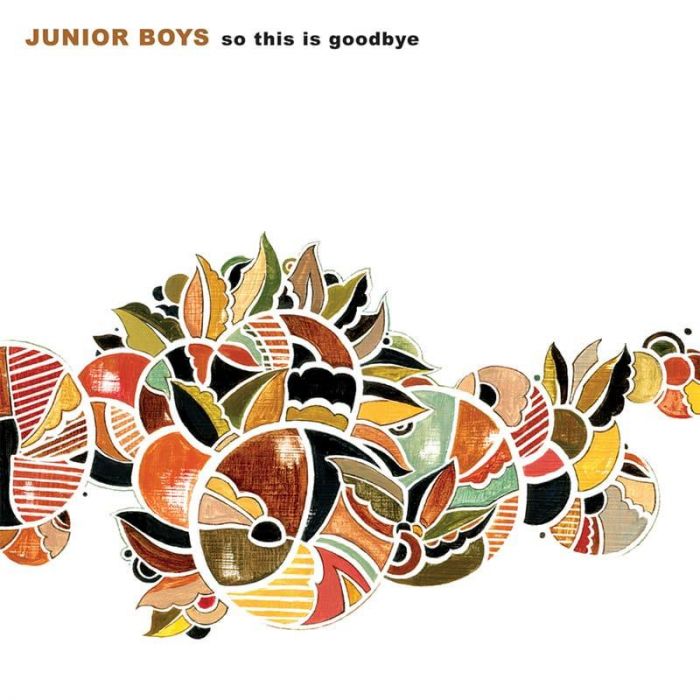So This Is Goodbye by Junior Boys (Review)

Although I enjoyed Junior Boys’ previous album, 2004’s Last Exit, I didn’t crush on it as much as some folks I know. However, So This Is Goodbye has been in a near-constant rotation ever since I picked it up back in September. The departure of founding member Johnny Dark might have something to do with this, the result being a much more graceful and flowing sound that moves even deeper into a form of electronic pop that sounds both shamelessly retro and breathlessly futuristic.
However crisp and infectious the beats and rhythms might be, however smooth and graceful the synth melodies might move, it is ultimately Jeremy Greenspan’s voice that proves to be Junior Boys’ chief saving grace. His sighing croon (or is it crooning sigh?) of a voice is dashing, seductive, nostalgic, regretful, and wounded — and often all at once — as if he’s resigned himself to the fact that he’ll always be in alone in the morning, even after the most torrid of club trysts.
For instance, even as “Count Souvenirs” creeps along with the same sort of seductive pall that graces classic Depeche Mode, Greenspan himself creeps through half-formed memories of previous relationships (“Empty stalls and shopping malls/That we’ll never see again/Hotel lobbies like painful hobbies/That linger on”) before finally pleading “Please, please don’t touch.” It could be that he’s talking to the song’s subject(s), or perhaps to himself, but whatever the case, there’s fear there; fear that even the slightest disturbance might reveal those memories to actually be less than they seem.
“When No One Cares” (yes, it’s a Sinatra cover) is the album’s most intimate moment, the ultimate lonely hearts ballad. With only stark piano notes and synth pulses that echo off into the night as accompaniment, Greenspan laments “You can’t believe a love like hers/Could come from someone new/When no one cares but you” with a detachment. And yet, there’s something about his falsetto that still sounds aching and wounded, as if he’s barely keeping himself collapsing against the synth rack in sobs. Even brush-off songs such as the title track, where Greenspan concludes “Our love’s lost in the rough/And I’ve had enough/So this is goodbye,” are tinged with regret thanks to his sigh of a voice.
Thankfully, all of that melancholia never reduces the album to pure navel-gazing, because the beats are crisp and infectious and the synth melodies are smooth and graceful. Greenspan and engineer Matt Didemus craft a blend of ’80s synth-pop, disco, and club music that is intoxicating and affecting because there’s no excess or fat whatsoever to be found. Every single note, melody, and beat on So This Is Goodbye has been streamlined as much as possible, then buffed and polished until it glows like a Nagel painting. Rather than make things sound artificial and produced, the result is music that is supremely elegant and refined, that moves with the utmost of ease and invites you to do the same.
The album’s first single, “In The Morning,” is easily one of the year’s top songs; it was certainly the song that I listened to the most in 2006. The stomping beats and groaning synths are irresistable, as is the silky bassline that undergirds Greenspan’s attempts to woo a pretty young thing. Seeing as how this is a Junior Boys song, heartbreak is inevitable (“And in the morning why’d you tell me that it’s over?/You think you’d do better to stick with someone older”), which contrasts with the piece’s urgent tone highlighted by the funky synth breakdown and Greenspan’s sensual gasps.
For all of its polish, its obvious throwbacks to the great synth-driven music of yore, and its undeniable sense of elegant kitschiness, it always comes back to Greenspan’s voice. Like the Pet Shop Boys before them, Junior Boys take what would otherwise be disposable remix fodder for the clubs and transform it into something heartbreaking and affecting.
“FM” sends the album out, not with a bang or on some club-friendly high, but on one long pining sigh. Once again, Greenspan finds himself trying to hold onto a lover, imploring them to stay for “just one more round in that tourist town” even as he prepares to resign himself to the inevitable (“And then one more year/Becomes one more year/And you’ll forget me soon, I fear”). The song drips with ruminations of time and aging, until all Greenspan can do is cry sadly and yet so effortlessly into the night as he makes yet one final request for connection.
As with so much of So This Is Goodbye, it’s a moment of vulnerability and heartache, something one does normally not associate with dance-influenced electronic pop. Which serves only to make it all the more affecting.